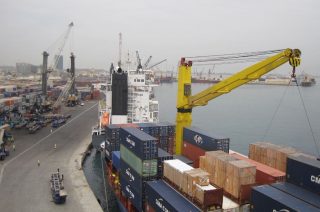In October 2016, the United Nations shipping agency, International Maritime Organization (IMO), set global regulations to limit the number of sulfur emissions from marine vessels, expected to come into force from January 1, 2020.
Under the new standards, ships are required to use fuel with a reduced sulfur content of 0.5 percent, down from the current maximum of 3.5 percent. Generally, the goal is to enforce the use of cleaner fuel thereby reducing the amount of sulfur oxide from ships, which is detrimental to the environment and health.
Studies show that air pollution from ships has led to rising cases of respiratory diseases, especially among populations living close to ports and coastlines. And ship-source pollutants are closely linked to climate change and public health impacts.
The industry is among the biggest sulfur emitters globally. Commercial ships burn fuel for energy and emit several types of air pollution as by-products. However, while the IMO pushes for environmentally friendly operations in the sector, there are concerns over the economic impacts of the new regulations.
Extra costs
With marine vessels needing to either install exhaust gas cleaning systems or switch to low sulfur distillate fuels or low sulfur fuel oils (which are more costly), compliance with the sulfur content requirement will add extra costs to the shipping industry. There will be a far-reaching impact on global trade as well, considering about 90 percent of world trade transported by sea.
In financial terms, analysts estimate the additional costs for the container shipping sector alone could be $35-$40 billion while other reports suggest it could send costs up by as much as $60 billion in 2020. Landed costs of products will surge with shipping lines expected to pass on the additional costs of using low sulfur fuel, thus, importers and the final consumer face a possible increase in prices.
The costs of freight on oceans will “increase as the marine sector uses more costly fuels, which has wide-reaching consequences across the global economy,” analysts at consulting firm Wood Mackenzie, say.
A shift to lower sulfur fuel would also reduce the availability of refinery products, including diesel and jet fuel, and could substantially inflate prices. Observers warn that prices could surge by almost 20 percent.
In a country such as Nigeria, a 20 percent price rise in diesel could slow down GDP growth by 0.2 percent, experts say. This is because nearly 80 million people – about 40 percent of the population – do not have access to the electricity grid and most industrial activities such as powering machinery, computer servers and mobile phone towers rely on diesel generators.
A possible rise in jet fuel prices would significantly hit the aviation industry. Presently, fuel consumption accounts for close to 25 percent of airline operating expenses. The International Air Transport Association (IATA) has warned of an uncertain future, saying that price hikes due to supply constraints will adversely affect the sector.
“The potential jet fuel price increase might pose a risk for airline profitability and risk management,” IATA said in a report, adding that airlines should prepare for IMO 2020 risks and incorporate them in their broader management strategies.
With just over three months left before the new strict sulfur requirements come into effect, players in the shipping industry have reportedly intensified lobbying for the postponement of its implementation. But the IMO is opposed to the idea based on time constraints.
Given the complex process involved in changing the agency’s regulations – an estimated 22 months for any amendments to take effect – there will not be enough time to delay the date.
As the IMO implementation date approaches, analysts predict upheavals across the whole import and export value chain as well as in key industries like aviation, manufacturing, mining, oil, building, and construction owing to their heavy dependence on the shipping industry.








